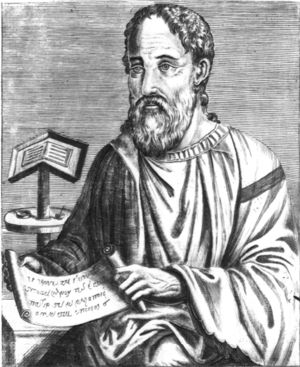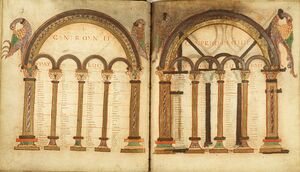أوسابيوس القيصري
Eusebius of Caesarea | |
|---|---|
 أوسابيوس في صورة حديثة in a modern image. | |
| وُلِد | Eusebius 260–265 قيصرية |
| توفي | 339–340 (عن عمر 74–80) |
| الوظيفة | أسقف ومؤرخ وtheologian |
| الفترة | الأسرة القسطنطينية |
| أبرز الأعمال | Ecclesiastical History, On the Life of Pamphilus, Chronicle, في الشهداء |
أوسابيوس القيصري (Eusebius of Caesarea ؛ /juːˈsiːbiəs/؛ باليونانية: Εὐσέβιος τῆς Καισαρείας، Eusébios tés Kaisareías؛ 260/265 – 339/340م)، ويُعرف أيضاً بإسم أوسابيوس الپامفيلي (من باليونانية: Εὐσέβιος τοῦ Παμϕίλου؛ Eusebius Pamphili)، كان مؤرخ المسيحية، و مفسر و مجادل مسيحي. وقد أصبح أسقف قيصرية حوالي سنة 314م. ومع پامفيلوس، كان دارساً للـ الكتاب المقدس القانوني ويُعتبر واحداً من أعلم مسيحيي زمانه.[1] وقد كتب Demonstrations of the Gospel, الإعدادات للإنجيل و On Discrepancies between the Gospels، دراسات للنصوص المقدسة. وبصفته "أبو تاريخ الكنيسة"[note 1] (يجب عدم الخلط مع لقب أبو الكنيسة)، أنتج التاريخ الكنسي، و عن حياة پامفيلوس، سجل الأحداث و عن الشهداء. كما أنتج سيرة قسطنطين الأكبر، أول امبراطور مسيحي، الذي كان أغسطس بين 306 و 337. الذي قام برسامة باسيليوس الكبير كاهنًا.
حياته
كان أوسابيوس غير مُعَمَّد عند اختياره أسقفًا سنة 362م، وعند وفاة ديانيوس Dianius انقسمت كنيسة قيصرية إلى قسمين، مثلما حدث مع القديس أمبروسيوس أسقف ميلان كان اختيار رجل علماني معروف من الجميع ومشهود له بالشخصية المستقيمة والرأي السديد الحل الأمثل للخروج من هذا الخلاف.
رسامة أوسابيوس بالقوة
لم يكن يوسابيوس يوافق بأي حال على هذه الكرامة التي اختير لها، فاستُخدِمت القوة العسكرية للتغلب على رفضه وإجبار الأساقفة على رسامته.
بعد رسامته أُطلِق سراح هؤلاء الأساقفة الذين أعلنوا رفضهم لهذه الرسامة التي تمت بالقوة واعتبروا رسامة يوسابيوس لاغية. إلا أن مجمعًا عقده إغريغوريوس النزينزي وبخهم على موقفهم هذا، معتبرًا أنه كان من الأكرم لهم المخاطرة بحياتهم برفضهم الرسامة يوسابيوس عن أن يخضعوا لإملاء الجمهور بسبب خوفهم على حياتهم.
تثبتت رسامة يوسابيوس من قِبَل الإمبراطور يوليانوس Julian الذي أظهر خسارته لفقده أحد خدام الدولة الممتازين، وهكذا جلس يوسابيوس على كرسي الأسقفية ثمان سنوات حتى سنة 370م.
افتقاده إلى المعرفة اللاهوتية
فَرَض أوسابيوس احترامه على الجميع، مُثبِتًا جدارته في شغر كرسي الأسقفية، وكان مُفيدًا للكنيسة في تلك الظروف. إلا أنه سرعان ما وجد نفسه في وسط تجربة شديدة، ذلك أنه مع كونه أسقفًا مستقيم الرأي والإيمان إلا أنه كان يفتقد المعرفة اللاهوتية وقوة الشخصية اللازمة لمواجهة الهرطقة التي ظهرت في الكنيسة.
علاقته بالقديس باسيليوس
من أوائل أعمال يوسابيوس الأسقفية رسامته باسيليوس كاهنًا، وسرعان ما توترت العلاقة بين الاثنين في الغالب بسبب الغيرة من قوة معرفة باسيليوس وتأثيره على الشعب، وكان أسلوب يوسابيوس المُهين في التعامل مع باسيليوس سببًا في اعتكاف الأخير لمدة ثلاث سنوات في بنتس Pontus.
إلا أنه لاحتياج يوسابيوس له لمقاومة هجوم الأريوسيين بقيادة فالنس Valens على كنيسة قيصرية، بالإضافة إلى نجاح وساطة غريغوريوس النزينزي مع صديقه القديم، عاد باسيليوس إلى قيصرية سنة 366م بعد أن تعلَّم كلاهما الحكمة من الماضي. فمن ناحيته التزم باسيليوس بتعليم الشعب دون التعرض لرئاسته الدينية، بينما قَنَع يوسابيوس برئاسته الرسمية وكرامته، فكان هو الذي يحكم بينما كان باسيليوس في الواقع هو الحاكم. وهكذا استمر الاثنان في انسجام وتوافق حتى نياحة يوسابيوس سنة 370م.[3]
أعماله
Onomasticon
نقد النص الانجيلي
Pamphilus and Eusebius occupied themselves with the textual criticism of the Septuagint text of the Old Testament and especially of the New Testament. An edition of the Septuagint seems to have been already prepared by Origen, which, according to Jerome, was revised and circulated by Eusebius and Pamphilus. For an easier survey of the material of the four Evangelists, Eusebius divided his edition of the New Testament into paragraphs and provided it with a synoptical table so that it might be easier to find the pericopes that belong together. These canon tables or "Eusebian canons" remained in use throughout the Middle Ages, and illuminated manuscript versions are important for the study of early medieval art, as they are the most elaborately decorated pages of many Gospel books. Eusebius detailed in Epistula ad Carpianum how to use his canons.
سجل الأحداث
The Chronicle (Παντοδαπὴ Ἱστορία (Pantodape historia)) is divided into two parts. The first part, the Chronography (Χρονογραφία (Chronographia)), gives an epitome of universal history from the sources, arranged according to nations. The second part, the Canons (Χρονικοὶ Κανόνες (Chronikoi kanones)), furnishes a synchronism of the historical material in parallel columns, the equivalent of a parallel timeline.[4]
The work as a whole has been lost in the original Greek, but it may be reconstructed from later chronographists of the Byzantine school who made excerpts from the work, especially George Syncellus. The tables of the second part have been completely preserved in a Latin translation by Jerome, and both parts are still extant in an Armenian translation. The loss of the Greek originals has given the Armenian translation a special importance; thus, the first part of Eusebius' Chronicle, of which only a few fragments exist in Greek, has been preserved entirely in Armenian, though with lacunae. The Chronicle as preserved extends to the year 325.[5]
تاريخ الكنيسة
In his Church History or Ecclesiastical History, Eusebius wrote the first surviving history of the Christian Church as a chronologically ordered account, based on earlier sources, complete from the period of the Apostles to his own epoch.[6] The time scheme correlated the history with the reigns of the Roman Emperors, and the scope was broad. Included were the bishops and other teachers of the Church, Christian relations with the Jews and those deemed heretical, and the Christian martyrs through 324.[7] Although its accuracy and biases have been questioned,[8] it remains an important source on the early church due to Eusebius's access to materials now lost.[9]
حياة قسطنطين
أعمال تاريخية صغرى
Before he compiled his church history, Eusebius edited a collection of martyrdoms of the earlier period and a biography of Pamphilus. The martyrology has not survived as a whole, but it has been preserved almost completely in parts. It contained:
- an epistle of the congregation of Smyrna concerning the martyrdom of Polycarp;
- the martyrdom of Pionius;
- the martyrdoms of Carpus, Papylus, and Agathonike;
- the martyrdoms in the congregations of Vienne and Lyon;
- the martyrdom of Apollonius.
Of the life of Pamphilus, only a fragment survives. A work on the martyrs of Palestine in the time of Diocletian was composed after 311; numerous fragments are scattered in legendaries which have yet to be collected. The life of Constantine was compiled after the death of the emperor and the election of his sons as Augusti (337). It is more a rhetorical eulogy on the emperor than a history but is of great value on account of numerous documents incorporated into it.
عمل اعتذاري وعقائدي
أعمال تفسيرية ومتنوعة
مذهب
التقييم
انظر أيضاً
- آباء الكنيسة
- قسطنطين الأول والمسيحية
- المسيحية المبكرة
- Fifty Bibles of Constantine
- Travelogues of Palestine
ملاحظات
المراجع
الهامش
- ^ Gonzalez, Justo L. (2010-08-10). The Story of Christianity: Volume 1: The Early Church to the Dawn of the Reformation (in الإنجليزية). Zondervan. pp. 149–150. ISBN 978-0-06-185588-7.
- ^ "General Audience of 13 June 2007: Eusebius of Caesarea | BENEDICT XVI". www.vatican.va. Retrieved 2021-06-01.
- ^ يوسابيوس أسقف قيصرية بالكبادوك, الموجة القبطية
- ^ Barnes, Constantine and Eusebius, 112.
- ^ Barnes, Constantine and Eusebius, 112–13, 340 n. 58.
- ^ Chesnut, Glenn F. (1986), "Introduction", The First Christian Histories: Eusebius, Socrates, Sozomen, Theodoret, and Evagrius
- ^ Maier, Paul L. (2007), Eusebius: The Church History – Translation and Commentary by Paul L. Maier, p. 9 and 16
- ^ See, e.g., James the Brother of Jesus (book) by Robert Eisenman.
- ^ "Ecclesiastical History", Catholic Encyclopedia, New Advent, http://www.newadvent.org/cathen/07365a.htm
المصادر
- Barnes, Timothy D. (1981). Constantine and Eusebius. Cambridge, MA: Harvard University Press. ISBN 978-0-674-16530-4.
- Eusebius (1999). Life of Constantine. Averil Cameron and Stuart G. Hall, trans. Oxford: Clarendon Press. ISBN 978-0-19-814924-8.
- Drake, H. A. (2002). Constantine and the bishops the policy of intolerance. Baltimore: Johns Hopkins Press. ISBN 978-0-8018-7104-7.
- Kofsky, Aryeh (2000). Eusebius of Caesarea against paganism. Leiden: Brill. ISBN 978-90-04-11642-9.
- Lawlor, Hugh Jackson (1912). Eusebiana: essays on the Ecclesiastical history of Eusebius, bishop of Caesarea. Oxford: Clarendon Press.
- Levine, Lee I. (1975). Caesarea under Roman rule. Leiden: Brill. ISBN 978-90-04-04013-7.
- Louth, Andrew (2004). "Eusebius and the Birth of Church History". In Young, Frances; Ayres, Lewis; Louth, Andrew (eds.). The Cambridge history of early Christian literature. Cambridge: Cambridge Univ. Press. pp. 266–274. ISBN 978-0-521-46083-5.
- Momigliano, Arnaldo (1989). On pagans, Jews, and Christians. Middletown, CT: Wesleyan University Press. ISBN 978-0-8195-6218-0.
- Newman, John Henry (1890). The Arians of the Fourth Century (7th ed.). London: Longmans, Green and Co.
- Sabrina Inowlocki & Claudio Zamagni (eds), Reconsidering Eusebius: Collected papers on literary, historical, and theological issues (Leiden, Brill, 2011) (Vigiliae Christianae, Supplements, 107).
- Wallace-Hadrill, D. S. (1960). Eusebius of Caesarea. London: A. R. Mowbray.
للاستزادة
- Attridge, Harold W.; Hata, Gohei, eds. (1992). Eusebius, Christianity, and Judaism. Detroit: Wayne State Univ. Press. ISBN 978-0-8143-2361-8.
- Chesnut, Glenn F. (1986). The first Christian histories : Eusebius, Socrates, Sozomen, Theodoret, and Evagrius (2nd ed.). Macon, GA: Mercer University Press. ISBN 978-0-86554-164-1.
- Drake, H. A. (1976). In praise of Constantine : a historical study and new translation of Eusebius' Tricennial orations. Berkeley: University of California Press. ISBN 978-0-520-09535-9.
- Eusebius (1984). The History of the Church from Christ to Constantine. G.A. Williamson, trans. New York: Dorset Press. ISBN 978-0-88029-022-7.
- Grant, Robert M. (1980). Eusebius as Church Historian. Oxford: Clarendon Pr. ISBN 978-0-19-826441-5.
- Valois, Henri de (1833). "Annotations on the Life and Writings of Eusebius Pamphilus". The Ecclesiastical History of Eusebius Pamphilus. S. E. Parker, trans. Philadelphia: Davis.
وصلات خارجية
- مصادر رئيسية
- Church History (Eusebius); The Life of Constantine (Eusebius), online at ccel.org.
- History of the Martyrs in Palestine (Eusebius), English translation (1861) William Cureton. Website tertullian.org.
- Eusebius of Caesarea, The Gospel Canon Tables
- Eusebius, Six extracts from the Commentary on the Psalms.
- Opera Omnia by Migne Patrologia Graeca with analytical indexes complete Greek text of Eusebius' works
- Works by or about أوسابيوس القيصري at Internet Archive
- Works by أوسابيوس القيصري at LibriVox (public domain audiobooks)

- مصادر ثانوية
- "Eusebius" in New Advent Catholic Encyclopedia (1917)
- Eusebius of Caesarea at the Tertullian Project
- Extensive bibliography at EarlyChurch.org
- Chronological list of Eusebius's writings
| ألقاب دينية | ||
|---|---|---|
| سبقه Agapius of Caesarea |
Bishop of Caesarea c. 313–339 |
تبعه Acacius |
- Short description is different from Wikidata
- Articles with hatnote templates targeting a nonexistent page
- Articles containing Ancient Greek (to 1453)-language text
- أوسابيوس
- مواليد عقد 260
- وفيات 339
- رومان القرن الثالث
- يونانيو القرن الثالث
- 4th-century Christian saints
- 4th-century Christian theologians
- يونانيو القرن الرابع
- مؤرخو القرن الرابع
- فلاسفة القرن الرابع
- رومان القرن الرابع
- كتاب القرن الرابع
- Amillennialism
- أساقفة قيصرية
- Christian anti-Gnosticism
- Chronologists
- آباء الكنيسة
- مؤرخو المسيحية
- مؤرخو الكنيسة الكاثوليكية
- Late Antique writers
- People of Roman Syria
- Roman-era Greek historians

